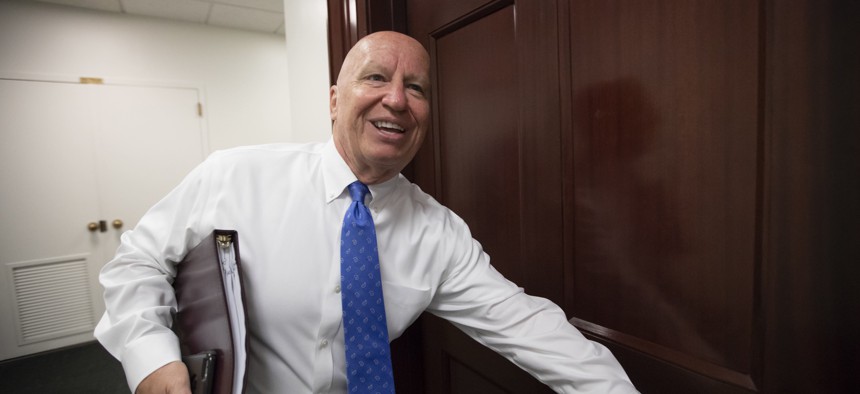'Tax Reform 2.0' Would Permanently Curtail State and Local Deduction

House Ways and Means Committee Chairman Kevin Brady, R-Texas, arrives for a closed-door GOP meeting in the basement of the Capitol in June 2018. AP Photo/J. Scott Applewhite

Connecting state and local government leaders
Some state and local government leaders have chafed at the cap on the so-called SALT deduction.
Update: The House approved the legislation on Sept. 28, but the measure is considered to have no chance in the Senate.
Original story: Tax legislation House Republicans released Monday would make permanent a limit on state and local tax deductions put in place as part of last year's GOP-led revamp of the federal tax code.
House Ways & Means Chairman Kevin Brady, of Texas, unveiled a package of three bills dubbed "Tax Reform 2.0." A provision in one of the bills would remove the Jan. 1, 2026 expiration date for a $10,000 cap on the deduction individual taxpayers can claim on their federal tax returns for certain state and local tax payments.
The cap imposed on the so-called SALT deduction was among the more controversial aspects of last year's tax overhaul and elicited strong push back from local government groups and some state officials. But it also provided one of the heftiest offsets for the corporate and individual tax cuts that are central to the tax law.
While the top corporate tax rate cuts to 21 percent from 35 percent are not set to expire, rate cuts in the law for individuals are only set to stay in effect through the end of 2025. The new proposals would lock in cuts for individuals and small businesses, along with making other changes to the current tax code, according to a brief GOP summary.
"Locking in the permanence, we think, is fair and it’s pro-growth,” Brady said on the CNBC program "Squawk Box."
He also said that he hopes to see the Ways & Means Committee take up the new tax legislation on Thursday and to have it ready for a House floor vote in September.
But the tax proposals face long odds in the Senate.
Sen. John Thune, a South Dakota Republican who is a member of the Republican leadership said last week that the chances are "probably slim to none" that the Senate will take up sweeping tax legislation ahead of the November elections, the National Journal reported.
The limitations imposed by the new tax law on the SALT deduction have prompted some states to explore options to give their taxpayers pathways for effectively avoiding the caps.
But the U.S. Treasury Department and the IRS proposed regulations in late August that would block one of the main ways that states had sought to do so, which involved relying on charitable deductions.
Higher-tax states that tend to lean Democratic are mainly the ones that have chafed over the caps since they were imposed. New York, Connecticut, Maryland and New Jersey have gone so far as to file a lawsuit against the federal government over them.
The top Democrat on the House Ways & Means Committee, U.S. Rep. Richard Neal, of Massachusetts, derided the latest GOP plan.
"With this second attempt at major tax legislation," he said, "congressional Republicans have doubled down on their initial tax scam and are yet again putting the wealthiest, most privileged Americans ahead of average, hardworking families."
Bill Lucia is a Senior Reporter for Government Executive's Route Fifty and is based in Washington, D.C.

NEXT STORY: On the Front Lines of Wildfires, Counties Fear Waning Funding





